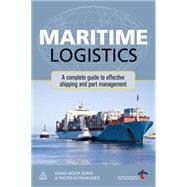
| Notes on the contributors | p. ix |
| Preface | p. xv |
| Introduction | p. 1 |
| Introduction to maritime logistics | p. 3 |
| Background | p. 3 |
| Outline of the book | p. 4 |
| Defining maritime logistics and its value | p. 9 |
| Introduction | p. 9 |
| Maritime logistics in concept | p. 10 |
| Maritime logistics value defined | p. 15 |
| Strategic significance of maritime logistics value | p. 18 |
| Concluding remarks | p. 19 |
| International maritime trade and logistics | p. 23 |
| Introduction | p. 23 |
| Logistics and supply chain management | p. 24 |
| Logistics and transport | p. 25 |
| Global trade and international maritime trade | p. 26 |
| Conclusions and discussion | p. 42 |
| Intermodal freight transport and logistics | p. 45 |
| Introduction | p. 45 |
| Characteristics of intermodal transport | p. 45 |
| Advantages of intermodal transport | p. 48 |
| Containerization and intermodal transport | p. 49 |
| Development of intermodal transport | p. 52 |
| Combined transport operators and their services | p. 55 |
| Towards innovative intermodal transport | p. 56 |
| The human element in maritime logistics | p. 59 |
| Introduction | p. 59 |
| The human element in science and theory | p. 61 |
| Effects on system performance and wellbeing | p. 63 |
| Concluding remarks | p. 71 |
| Shipping Logistics | p. 75 |
| Developing liner service networks in container shipping | p. 77 |
| Introduction: background on liner shipping | p. 77 |
| Configuration and design of liner shipping services | p. 78 |
| Shipping routes, network patterns and port centrality | p. 86 |
| Conclusions | p. 96 |
| Supply chain integration of shipping companies | p. 101 |
| Introduction | p. 101 |
| Supply chain integration in the maritime shipping industry | p. 102 |
| The impact of supply chain integration on shipping firm performance | p. 118 |
| Conclusion and further research | p. 121 |
| Logistics strategy in container shipping | p. 125 |
| Introduction | p. 125 |
| Literature review | p. 126 |
| Container line logistics activities | p. 127 |
| Liner operator case studies | p. 132 |
| Strategic groups | p. 139 |
| Conclusions | p. 143 |
| Tanker shipping logistics | p. 147 |
| Introduction | p. 147 |
| Transfer components | p. 147 |
| Marine terminals | p. 148 |
| Contractual relationships | p. 150 |
| Cargo transfer procedures | p. 155 |
| Cargo losses | p. 159 |
| Conclusion | p. 160 |
| Dry bulk shipping logistics | p. 163 |
| Dry bulk trade | p. 163 |
| Dry bulk fleet | p. 164 |
| Economies of dry bulk trade | p. 167 |
| Principles of dry bulk shipping logistics | p. 169 |
| Conclusion | p. 175 |
| Port Logistics | p. 177 |
| Dry port in concept and practice | p. 179 |
| Introduction | p. 179 |
| Intermodality and seaport inland access | p. 180 |
| Intermodal terminal facilities | p. 181 |
| The dry port concept | p. 183 |
| Dry port examples in Europe | p. 189 |
| Conclusions | p. 191 |
| Defining logistics hub and its application for container ports | p. 195 |
| Introduction | p. 195 |
| Logistics hub in perspective | p. 195 |
| Application of logistics hub to container port | p. 198 |
| Economics and social network theories for container hub port evolution | p. 203 |
| Concluding remarks | p. 207 |
| Hinterland logistics and global supply chains | p. 211 |
| Introduction | p. 211 |
| Hinterland logistics - supply chain accessibility and efficiency | p. 216 |
| Hinterland transport system design | p. 221 |
| Hinterland logistics - strategy | p. 221 |
| Hinterland logistics - management | p. 225 |
| Hinterland logistics and its influence on global supply chains | p. 229 |
| Conclusions | p. 230 |
| Port and logistics chains: changes in organizational effectiveness | p. 233 |
| Introduction | p. 233 |
| Ports and logistics chains | p. 234 |
| Port authorities in logistics chains | p. 240 |
| Conclusion | p. 262 |
| Logistics performance of supply chain-oriented ports | p. 271 |
| Introduction | p. 271 |
| Review of relevant literature | p. 272 |
| Evolution of port research | p. 275 |
| Supply chains and seaports | p. 281 |
| Integration of ports in supply chains | p. 285 |
| Research model and data collection | p. 295 |
| Empirical analysis and results | p. 296 |
| Conclusion | p. 302 |
| Conclusion | p. 315 |
| Topics of investigation and their importance | p. 315 |
| Outcomes and implications | p. 317 |
| Index | p. 321s |
| Table of Contents provided by Ingram. All Rights Reserved. |
The New copy of this book will include any supplemental materials advertised. Please check the title of the book to determine if it should include any access cards, study guides, lab manuals, CDs, etc.
The Used, Rental and eBook copies of this book are not guaranteed to include any supplemental materials. Typically, only the book itself is included. This is true even if the title states it includes any access cards, study guides, lab manuals, CDs, etc.